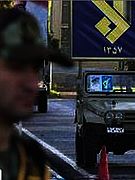Concerns Over Differences in the Armed Forces
» Warnings to Security and Intelligence Leaders
As differences and dissatisfaction among members of Iran’s armed services have been growing, particularly after such events as the disputed tenth presidential elections in 2009, new international sanctions and serious military threats, the head of Iran’s military justice organization expressed his concerns on this and issued a warning.
Speaking at a seminar on “Security and Intelligence” organized by the judiciary of the armed forces, cleric Mohammad-Kazem Bahrami said that “differences and division” were among the most serious security threats. “Espionage and overthrow are not the only issues that hurt the security of the country. Differences most certainly have an even more destructive impact,” he said.
He supported his argument by presenting instances and quotes from the Quran and imam Ali, the highest Shia leader.
Bahrami’s name was recently added to EU’s sanctions list on people who have violated human rights. While saying that “interference in the personal and family affairs of individuals, including other issues unrelated to work, are not justified, all the concerns and actions of a security officer should be to protect the organization and the staff to prevent any harm to them.”
These remarks come as various reports have surfaced during the last two years, indicating divisions and differences among the armed forces of Iran, particularly after the 2009 presidential elections and the numerous protests over its announced results. These differences have been growing and are more visible because of other major events such as the differences between Mahmoud Ahmadinejad and ayatollah Ali Khamenei, newer international sanctions against Iran, and the public military threats against the country.
But even under circumstances in which differences among the armed forces are not expressly published because of specific security directives and institutional structures, some senior authorities inside the Revolutionary Guards (IRGC), the Basij, the police and the military have implicitly confirmed the existence of growing differences among security and military services.
Mohammad Ali Jaafari, the commander in chief of the IRGC for example in July/August 2010 confirmed the existence of support for Mir-Hossein Mousavi and the Green Movement in his force and their displeasure of the IRGC’s measures in 2009. He specifically said that the IRGC had made efforts to “convince” these critics and added, “Many of the ambiguities (meaning differences) have been resolved and they have become convinced that the events were wrong. This is more important than physically confronting them or eliminating them.” A year after that, conservative cleric ayatollah Mohammad Taghi Mesbah Yazdi, pounced on a group of IRGC commanders and authorities and said, “What is the problem with you for having contacts with these swindlers who are outside and for consulting with them, even as you claim to do so to understand them?”
In October/November too, cleric Mohammad Hajizadeh, the representative of the supreme leader in the Bushehr province IRGC force said at a commencement ceremony in Bushehr, “Many of our valuable forces were distracted and derailed because of recent deviations and the 2009 sedition events because they had not acquired sufficient wisdom and were thus lost.”
These differences are not confined to the IRGC and exist in the Basij force as well. In September/October of 2010 Hossein Hamedani, the then commander of Tehran’s Mohammad Rasool Allah IRGC force told Khabar Online website, “Some security officers at a time had wavered in confronting the sedition of 2009 (this is the term Iranian officials use for the protests against the disputed 2009 presidential elections), or they acted badly and presented a bad image of the Basij.” In the same talk, Hamedani preached about divine purpose for power.
Another force that played a role in the violent and brutal crackdown of post-election protestors was the police. The commander of the police, Ismail Ahmadi-Moghadam, also spoke of this issue. Speaking to his forces on October 2, 2010 he alluded to disorderly conduct of some of his officers in following the orders of their commanders regarding clashing with the protestors. “Police officers should not be confused about who is right on this issue,” he said, a reference to the protests and the role of the police in confronting it.
The armed forces of Iran too have had similar issues. General Attaollah Salehi, the supreme commander on December 5, 2011 said, “When we went to the barracks and saw photographs of the leaders of the leaders of the sedition in some quarters, we did not tell them to tear up the photos but told their commanders to change their sentiments so that the soldiers themselves would tear up the photos.”
These differences have in some situations resulted in dismissals from the force. On February 15, 2012, minister of defense Ahmad Vahidi who is also a senior commander of the IRGC spoke of the silence of some leaders of Jihad over the actions of the seditionists and criticized them.
Ali Shamkhani, another former IRGC commander who was the minister of defense in Mohammad Khatami’s presidency and who is the current president of the Defense Policy Research Center also spoke about “dismissal because of criticism” and while referencing the criticism of some former commanders over the conditions in the country issued a warning saying, “How could someone who was a supporter of the revolution not support it today?” He also criticized the propaganda against the former leaders of the Jihad and martyrdom.
Another indication that some IRGC commanders were sympathetic to the cause of the Green Movement is the fact that while ayatollah Khamenei had always sent condolence messages to the family of those commanders who died during the last two years, there are at least four instances when such condolences were not sent to the families of commanders who had died, while others such as Ali Akbar Hashemi Rafsanjani, who has publicly criticized the government’s actions against the 2009-2010 protestors, did send them his condolences.


